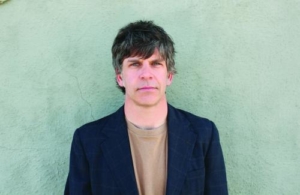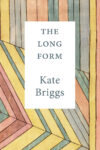 There are only two kinds of novel: plot-driven potboilers that propel you from the very first page and navel-gazing literary texts in which nothing really happens at all. Or so some Amazon reader reviews would have us think. When, actually, there are four kinds of novel, the two I mention, yes, but also their respective inversions: plot-driven bores, and navel-gazing sagas you read in a few breathless sittings. Wait — what I really mean to say is there are five kinds of novel. The four I mention above, of course (and of those four it barely needs noting there are an infinite number of variations, and so as many kinds of novels . . .), and a fifth! The book that does what it wants, breaks “rules,” goes a bit mad, bastardizing form and genre, and the only way to judge its merits (like any book) is by the writing. Some recent books of the fifth persuasion might include, say, Bennett Sims’ A Questionable Shape or Sara Levine’s Treasure Island!!! I confess my favorite kind is number five, the last of our exhaustive and rigorous list, the redheaded stepchild of narrative, the unclassifiable, the strange, and the type that best represents each and every human voice: unique. Jason Porter’s first novel, Why Are You So Sad?, is just that kind of book.
There are only two kinds of novel: plot-driven potboilers that propel you from the very first page and navel-gazing literary texts in which nothing really happens at all. Or so some Amazon reader reviews would have us think. When, actually, there are four kinds of novel, the two I mention, yes, but also their respective inversions: plot-driven bores, and navel-gazing sagas you read in a few breathless sittings. Wait — what I really mean to say is there are five kinds of novel. The four I mention above, of course (and of those four it barely needs noting there are an infinite number of variations, and so as many kinds of novels . . .), and a fifth! The book that does what it wants, breaks “rules,” goes a bit mad, bastardizing form and genre, and the only way to judge its merits (like any book) is by the writing. Some recent books of the fifth persuasion might include, say, Bennett Sims’ A Questionable Shape or Sara Levine’s Treasure Island!!! I confess my favorite kind is number five, the last of our exhaustive and rigorous list, the redheaded stepchild of narrative, the unclassifiable, the strange, and the type that best represents each and every human voice: unique. Jason Porter’s first novel, Why Are You So Sad?, is just that kind of book.
The story is really quite simple: Raymond Champs cannot sleep because he is depressed, and makes the grand leap, ridiculous as it is rational, that all the world, every one of us, is suffering from an epic case of the blues. “I was in my bed when the thought came to me: Have we all sunken into a species-wide bout of clinical depression? A severe, but subtle, despondency, germinating in every single one of us. The thought hit me. Smacked me as true. Its flawless pitch rang on and on, adhering to my consciousness like shit on shoe.” Incidentally, that’s a hell of an opening paragraph. Raymond turns to his wife, who seems endlessly patient, but also seems to have had it up to here with his moping. He asks, “Brenda, is it me or is every single person we know depressed?” “You are,” she says, “I’m not.” Raymond does not like (or believe) her answer. And then he has an idea. He will come up with a survey, “a test. An exam. A questioning.” Brenda does not approve.
A few sample questions:
When was the last time you felt happy?
Was it a true, pure happy or a relative happy?
Are you who you want to be?
Do we need more sports?
Why are you so sad?
He distributes the survey at work and tells fellow employees it’s “part of our bi-quarterly assessments. . . . They don’t want us feeling any of this low, quiet crushing that some suspect might be going around.”
Why Are You So Sad? is hilarious, morbid, and smart, utterly unique, like Kierkegaard writing an episode of The Office. Not a whole lot “happens,” I guess, in the novel. That said, I could not put it down. Porter and I spoke some over drinks, and some over email while Porter was on book tour.
Scott Cheshire: How is your mood?
Jason Porter: Suspiciously content.
Good to hear. So, where did the idea of using a survey come from? Are there other novels you used as a model?
I don’t know of other novels that have tried this, but I wouldn’t be surprised if there are some, somewhere. You’d have to ask somebody well read to find out.
I am definitely attracted to less traditional forms. I like to be surprised. And I have an untidy mind. So I need to believe in the artistic validity of the misshapen, or there won’t be a lot of room for me as a writer.
The idea for a survey sprung up, much to my luck, while I was trying to find a course for the novel. It wasn’t something that arrived to me before I started writing. I had what is the first sentence of the book, or something like it, right away. And almost immediately I knew I had a voice I wanted to follow. I also knew I would enjoy taking an idea that floated by briefly in my own head and letting this fictional character obsess over it (largely so I wouldn’t have to). But I didn’t know what to do next, which is always the case. And at that time in my writing I was doing a lot of this — finding an interesting voice and then have him or her sit still in endless inactivity. I was afraid to make decisions. So to change that I had this character promise to himself that he would take a survey of three people and if they were all sad, in his unqualified estimation, he would consider it proof enough to confirm his theory — that the world’s population was succumbing to a deep and probably viral form of despair — which would in his mind justify quitting his job. I didn’t know where it would go then, but at least it was a decision.
Fortunately all this was happening while I was taking a workshop with the supreme Peter Carey. And Peter told me to slow down and take the survey idea a little more seriously. He’s a smart man. We already knew that. And from then on I was sailing, in miserable and doubtful waters, but still I was sailing. The survey opened everything up, and served as a key I could turn to at any time I was unsure how to proceed.
The tone of the book is quite complicated, because it’s funny, very funny — I laughed out loud a few times and mothers at the French cafe I was sitting at gave me odd looks — but it’s also quite sad. And the funny depends on that sad. If I didn’t believe Raymond’s sadness the funny would fail.
Well, thank you very much. You are kind. Which is why I won’t point out that there could be other reasons besides your distinctive, almost feral laugh that had the mothers giving you looks.
I wish I had a good way to talk about this besides that I had to spend a lot of time honing the tone. (That sounds like a bad title for a book on writing “Honing The Tone.”) It’s hard to get more specific than that. You just keep putting your ear up to the thing, asking yourself if it is on key. I guess a big part of it was a matter of trying to cut out gratuitous and/or less friendly jokes. There was a lot of that. But I can’t say for sure. I never knew if it was working, because there was this tight rope walk of keeping the voice secure enough that you wanted to trust it, but unstable enough that you believed he might make some less rational choices and observations.
I feel like the tone is established immediately, right in the opening paragraph.
It really did start with that first paragraph. It strikes me as a bad way to write. I find more often editing my work and lending a hand with others’ that you can almost always cut the first and last paragraphs and have something much stronger, but I had this extreme paranoid thesis straight off, and it felt like an anchor. Plus I guess I liked that it got right to the problem. He takes all sorts of digressions along the way, but he didn’t beat around the bush at the start. He said: HERE IS MY DILEMMA: WE ARE FUCKED. I liked that.
Readers seem to talk about the book solely in terms of Raymond, but I feel like the book — aside from being a book about a man coming totally unhinged — is the story of a marriage, “the dark science behind marriage,” as Raymond puts it. What say you?
I will not object to what you just said. I could only believe a love story that acknowledged the painful messiness involved. I might enjoy one that didn’t, but I wouldn’t really believe it. Anyway, the emphasis on their relationship was something that came through in revisions. So much that I once considered having the first sentence be: “This is a love story.” But I chickened out with that. I think I had it there as a cue to myself more than anything, and it was probably only there for five minutes.
Brenda, Raymond’s wife, is such a good character drawn in deft, quick strokes. After Raymond first tells Brenda he thinks the whole world is depressed, she “let out a dramatic sigh, and slowly closed the book. She didn’t want to leave the story. As she turned to look at me she spilled a little bourbon.” We immediately get a sense that poor Brenda has had to deal with this sort of thing from him before.
I am so excited that people like her. That was tricky, because Raymond is telling the story, and he’s not happy, and their relationship has eroded a good deal, so since we’re trapped in his head, there was a risk she might come across as completely unsympathetic. And she is not a soft person. So I did worry it might feel one-sided, but I suppose I worried about everything. It all felt so invented, as I was inventing it. And I am not a licensed inventor. Fortunately readers are smart and willing to embrace quite a bit, in this case they realize it takes a lot to stay with somebody who is so committed to identifying every miserable detail that may or may not be present in life. And maybe too, the reader enjoys Brenda because she says things to Ray that the reader is dying to say, like, “Suck it up.”
You know, on my first read, I completely sympathized with Ray, and partly because the survey idea seemed so surreal and exaggerated and harmless for that. On the second read, though, the survey seemed entirely plausible, exaggerated of course, and I could see a company like Google, or Apple, or Ikea, absolutely trying to engage employees in a similar way. And this made Ray seem also voyeuristic and sort of creepy. I felt weird. Good weird.
I would love to say that was all the result of a perfectly executed strategy, but I think you know that when we write these things we are really stretching out into something we don’t understand yet. I am fighting back the urge to insert metaphors that involve blindness or reaching deep into unlit pantries. I suppose one thing I was hoping to answer to was a sense that felt super realistic to me, which was truly feeling like everybody is crazy for not acknowledging that everybody is crazy. Or if not that, disbelief that people are so set on pretending that life isn’t absurd. I have felt that, and when I feel that I actually feel more rational than everybody else rather than the other way around.
As for your sense that large corporations might be prone to act immorally, I think there is a strong basis for that. I will not judge you for feeling that way. I promise.
At some point the questions themselves make the reader voyeuristic, and they are relentless. Eventually, we consider how we would answer. Have you taken the survey?
No. It’s a terrible survey.
Now I know you judged a contest for the wonderful online literary journal Electric Literature, wherein people actually took the survey. And the winning survey made public was really quite beautiful, and spooky, because the tone sort of matched the book’s tone. Fancy question: is sadness unavoidably “beautiful,” like one character, the mysterious Ms. Glenda Fellowes-Allbrecht, says?
I am not exaggerating when I say I was the worst student of Philosophy ever produced by the University of California at Santa Cruz, so I will only really answer a question like that with either a poem or a novel. And hopefully that creative work will deflect the question back on the reader. But, the answer is yes.
As for the “contest,” that was a real eye opener. I was deeply humbled by the array of tragedy that flooded our inboxes. As for the “winner,” it ultimately wasn’t so much about being the saddest, because that was impossible to quantify. By the end of reading all of the entries I felt so pounded I reached for the one that had a few qualities that resonated with the novel. Whether or not that was a strategy of the contestant or a magical coincidence I hope to never know.
Talk to me about the end of the book, where the reader is enlisted to actually take part in a survey. We have two options: happy ending? or sad? And yes, I’m being entirely reductive, and it makes the choice seem simple . . . when it’s absolutely not, especially if the mysterious Ms. Glenda Fellowes-Albrecht is right.
Well, like the survey the options given to the reader aren’t really fair or unbiased. So, like the question in the survey, it may only be a “relative happy.” I also think it allows for a third option, which would be the saddest one yet. Or perhaps there are even more options. As I said, the reader is often smarter about the meaning than the author. But I refuse to weigh in on if I have a favorite, because I am attracted to this sense that we are connected to concurrent narratives within our own life, and I simply couldn’t see one existing more than the other, or I was too lazy, or I felt like it was fitting to turn it back on the reader in the spirit of the survey. I would love to claim I had a set strategy from the beginning, but as I said I was merely writing in the direction of a shape that made sense to me only if I didn’t try to reduce it through explanation. How’s that for ducking a question?
New York readers can see Jason Porter in conversation with Colum McCann at McNally-Jackson on February 5 at 7:00 pm.
Scott Cheshire earned his MFA from Hunter College. He is the interview editor at the Tottenville Review and teaches writing at the Sackett Street Writers’ Workshop. His work has been published in Slice, AGNI, Guernica and the Picador anthology The Book of Men. His first novel, High as the Horses’s Bridles, is forthcoming from Henry Holt. He lives in New York City.
This post may contain affiliate links.







